Complete Solutions to QUESTIONS (CHOOSING THE CORRECT OPTION) of chapter SAMPLE PAPER 2 (BIOLOGY) of Class 12 book with complete answers and questions
| Class 12 | BIOLOGY |
| Chapter | SAMPLE PAPER 2 (BIOLOGY) |
| OSWAL GURUKUL | QUESTIONS (CHOOSING THE CORRECT OPTION) |
| Number Of Questions | 66 |
| Academic Year | 2023-24 |
The technique called Gamete Intra Fallopian Transfer (GIFT) is recommended for those females:
View SolutionIn a population increased IMR and decreased MMR will:
View SolutionWhat is the genotype of the person suffering from Klinefelter's syndrome?
View SolutionWhat are the finger-like projections of trophoblast called?
View SolutionWhich of the following is not the function of a placenta?
View SolutionIn the event of pregnancy, the corpus luteum persists under the influence of:
View SolutionExine of pollen grain is formed of:
View SolutionA dicotyledonous plant bears flowers but never produces fruits and seeds. The most probable cause for the above situation is:
View SolutionIn_____female gametophytes stop their growth at 8 nucleate stages.
View SolutionOffspring produced by sexual reproduction exhibit more variation than those produced by asexual reproduction because
View SolutionNumber of chromosome pairs in human beings:
View SolutionWhat is the duration of juvenile phase in bamboo and interflowering period of Strobilanthes kunthiana respectively:
View SolutionThe law of co-dominance is used to explain the expression of only one of the parental characters in a monohybrid cross in __ and the expression of both in ____
View SolutionWhich of the following is a recessive trait in pea plants?
View SolutionExperimental verification of chromosomal theory of inheritance was proposed by:
View SolutionStudy of family history about inheritance of a particular trait in several generations of a family is called:
View Solution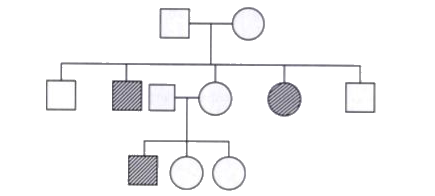
What is the mode of inheritance in the given pedigree?
View SolutionWhat approach used by Mendel was utterly new?
View SolutionDuring replication large amount of energy gets exhausted. The source of this energy is:
View SolutionA transcription unit in DNA is defined primarily by three regions in DNA. These regions are :
View SolutionWhich of the following rRNA shows structural as well as functional role in bacteria ?
View SolutionIn eukaryotes as well as prokaryotes those DNA sequences that appear in mature or processed RNA are known as
View SolutionChange in a single base pair of DNA can be termed as:
View SolutionName the island where Darwin visited and discovered adaptive radiation.
View SolutionWhich of the following represents the Hardy Weinberg equation?
View SolutionIn which type of natural selection the peak gets higher and narrower?
View SolutionThe industrial melanism phenomenon demonstrates:
View SolutionA nitrogen fixing microbe associated with the fern (Azolla) in rice fields is:
View SolutionWhich of the following is a non-symbiotic biofertiliser :
View SolutionBOD of waste water is estimated by measuring the amount of:
View SolutionWhich of the following organism has higher number of chromosomes?
View SolutionIf a butterfly has chromosome number 360 in its meiocytes (2n). What will be the chromosome number in its gametes?
View SolutionStrobilanthes kunthiana differs from bamboo in:
View SolutionDuring the process of fertilisation the pollen tube of the pollen grain usually enters the emrbyo sac through:
View Solution_____may be defined as occurrence of two or more embryos in one ovule.
View SolutionWhat is the function of germ pore?
View SolutionEndosperm is completely consumed by the developing embryo in:
View SolutionUrine test during pregnancy determines the presence of:
View SolutionAcrosome is a type of:
View SolutionConfirmatory test for STDs is:
View SolutionAssertion : Zygote is the only vital link between two generations of an organism.
Reason : Male and female gametes fuse to form a zygote.
View SolutionAssertion : A drop of temperature does not effect spermatogenesis.
Reason : During temperature drop the smooth muscles contacts and bring the testes closer to the pelvic cavity
View SolutionAssertion : Nucleopolyhedrovirus used as biocontrol agent.
Reason : It kills insects and pests.
View SolutionAssertion : Trichoderma, found in root system causes biological control of many pathogens.
Reason : The enzymes released by Trichoderma inhibits growth of many disease causing pathogens.
View SolutionAssertion : In co-dominance, `F_1` generation resembles both the parents.
Reason : An example is different type of red blood cells that determine ABO blood grouping in humans.
View SolutionRead the following and answer the following questions:
In testis, the immature male germ cells produces sperms by spermatogenesis that begins at puberty. It occurs in the seminiferous tubules of the testis. Seminiferous tubules are linked by germinal epithelium. Study the diagrammatic representation below and answer the following questions:
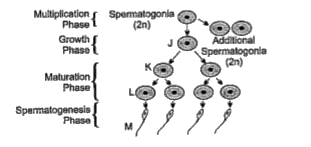
Transformation of L into M is known as:
View SolutionRead the following and answer the following questions:
In testis, the immature male germ cells produces sperms by spermatogenesis that begins at puberty. It occurs in the seminiferous tubules of the testis. Seminiferous tubules are linked by germinal epithelium. Study the diagrammatic representation below and answer the following questions:
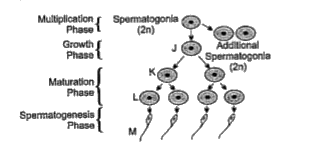
Select the correct option:
View SolutionRead the following and answer the following questions:
The endosperm makes the main source of food for the embryo. Generally the endosperm nucleus divides after the division of the oospore. There are many cases when endosperm is formed even before division of oospore. There are three general types of endosperm formations: (a) nuclear type, (b) cellular type, (c) helobial type. The endosperm is usually triploid but haploid endosperm is also found. Endosperm may either be completely consumed by developing embryo before seed maturation or it may persist in the mature seed.
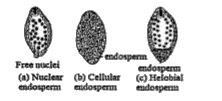
Coconut water is ____endosperm
View SolutionRead the following and answer the following questions:
The endosperm makes the main source of food for the embryo. Generally the endosperm nucleus divides after the division of the oospore. There are many cases when endosperm is formed even before division of oospore. There are three general types of endosperm formations: (a) nuclear type, (b) cellular type, (c) helobial type. The endosperm is usually triploid but haploid endosperm is also found. Endosperm may either be completely consumed by developing embryo before seed maturation or it may persist in the mature seed.
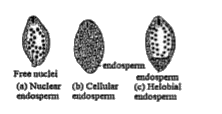
Persistent endosperm is found in:
View SolutionRead the following and answer the following questions:
The endosperm makes the main source of food for the embryo. Generally the endosperm nucleus divides after the division of the oospore. There are many cases when endosperm is formed even before division of oospore. There are three general types of endosperm formations: (a) nuclear type, (b) cellular type, (c) helobial type. The endosperm is usually triploid but haploid endosperm is also found. Endosperm may either be completely consumed by developing embryo before seed maturation or it may persist in the mature seed.
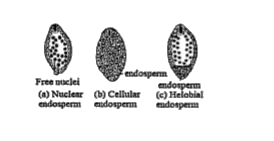
If an endosperm cell of a gymnosperm consists of 12 chromosomes, number of chromosomes in each root cell will be:
View SolutionRead the following and answer the following questions:
The endosperm makes the main source of food for the embryo. Generally the endosperm nucleus divides after the division of the oospore. There are many cases when endosperm is formed even before division of oospore. There are three general types of endosperm formations: (a) nuclear type, (b) cellular type, (c) helobial type. The endosperm is usually triploid but haploid endosperm is also found. Endosperm may either be completely consumed by developing embryo before seed maturation or it may persist in the mature seed.
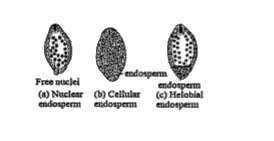
In angiosperms, normally after fertilisation:
View SolutionRead the following and answer the following questions:
The endosperm makes the main source of food for the embryo. Generally the endosperm nucleus divides after the division of the oospore. There are many cases when endosperm is formed even before division of oospore. There are three general types of endosperm formations: (a) nuclear type, (b) cellular type, (c) helobial type. The endosperm is usually triploid but haploid endosperm is also found. Endosperm may either be completely consumed by developing embryo before seed maturation or it may persist in the mature seed.
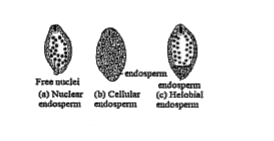
White kernel of tender coconut is:
View SolutionRead the following and answer the following questions:
Enzymes are best known for their ability to catalyse biochemical reactions without undergoing any change. A large number of enzymes are being used in biotechnological industry. Most of them are obtained from microbes. Proteases degrade proteins and polypeptides. Most of the commercially applicable proteases are alkaline and are biosynthesised mainly by bacteria such as Pseudomonas, Bacillus and some fungi like, Aspergillus. These enzymes are used in clearing beer, softening of bread and meat, degumming of silk, etc. Alkaline serine proteases have the largest applications in bio-industry. Alkaline proteases have shown their capability to work under high pH, temperature and in presence of inhibitory compounds. Another important group of enzymes is amylases. Amylolytic enzymes act on starch. These are obtained from Aspergillus, Rhizopus and Bacillus species. These are used in softening and sweetening of bread, production of alcoholic beverages from starchy materials, clearing of turbidity in juices caused by starch, etc.
Polypeptides are degraded by
View SolutionRead the following and answer the following questions:
Enzymes are best known for their ability to catalyse biochemical reactions without undergoing any change. A large number of enzymes are being used in biotechnological industry. Most of them are obtained from microbes. Proteases degrade proteins and polypeptides. Most of the commercially applicable proteases are alkaline and are biosynthesised mainly by bacteria such as Pseudomonas, Bacillus and some fungi like, Aspergillus. These enzymes are used in clearing beer, softening of bread and meat, degumming of silk, etc. Alkaline serine proteases have the largest applications in bio-industry. Alkaline proteases have shown their capability to work under high pH, temperature and in presence of inhibitory compounds. Another important group of enzymes is amylases. Amylolytic enzymes act on starch. These are obtained from Aspergillus, Rhizopus and Bacillus species. These are used in softening and sweetening of bread, production of alcoholic beverages from starchy materials, clearing of turbidity in juices caused by starch, etc.
Amylolytic enzymes are not obtained from
View SolutionRead the following and answer the following questions:
Enzymes are best known for their ability to catalyse biochemical reactions without undergoing any change. A large number of enzymes are being used in biotechnological industry. Most of them are obtained from microbes. Proteases degrade proteins and polypeptides. Most of the commercially applicable proteases are alkaline and are biosynthesised mainly by bacteria such as Pseudomonas, Bacillus and some fungi like, Aspergillus. These enzymes are used in clearing beer, softening of bread and meat, degumming of silk, etc. Alkaline serine proteases have the largest applications in bio-industry. Alkaline proteases have shown their capability to work under high pH, temperature and in presence of inhibitory compounds. Another important group of enzymes is amylases. Amylolytic enzymes act on starch. These are obtained from Aspergillus, Rhizopus and Bacillus species. These are used in softening and sweetening of bread, production of alcoholic beverages from starchy materials, clearing of turbidity in juices caused by starch, etc.
Clearing of turbidity in juices is achieved by
View SolutionRead the following and answer the following questions:
Enzymes are best known for their ability to catalyse biochemical reactions without undergoing any change. A large number of enzymes are being used in biotechnological industry. Most of them are obtained from microbes. Proteases degrade proteins and polypeptides. Most of the commercially applicable proteases are alkaline and are biosynthesised mainly by bacteria such as Pseudomonas, Bacillus and some fungi like, Aspergillus. These enzymes are used in clearing beer, softening of bread and meat, degumming of silk, etc. Alkaline serine proteases have the largest applications in bio-industry. Alkaline proteases have shown their capability to work under high pH, temperature and in presence of inhibitory compounds. Another important group of enzymes is amylases. Amylolytic enzymes act on starch. These are obtained from Aspergillus, Rhizopus and Bacillus species. These are used in softening and sweetening of bread, production of alcoholic beverages from starchy materials, clearing of turbidity in juices caused by starch, etc.
Select the incorrect option from the following:
View SolutionRead the following and answer the following questions:
Enzymes are best known for their ability to catalyse biochemical reactions without undergoing any change. A large number of enzymes are being used in biotechnological industry. Most of them are obtained from microbes. Proteases degrade proteins and polypeptides. Most of the commercially applicable proteases are alkaline and are biosynthesised mainly by bacteria such as Pseudomonas, Bacillus and some fungi like, Aspergillus. These enzymes are used in clearing beer, softening of bread and meat, degumming of silk, etc. Alkaline serine proteases have the largest applications in bio-industry. Alkaline proteases have shown their capability to work under high pH, temperature and in presence of inhibitory compounds. Another important group of enzymes is amylases. Amylolytic enzymes act on starch. These are obtained from Aspergillus, Rhizopus and Bacillus species. These are used in softening and sweetening of bread, production of alcoholic beverages from starchy materials, clearing of turbidity in juices caused by starch, etc.
A farmer harvests coms and prepares corn starch. He wants to prepare some corn syrup from this. For the conversion he needs to use enzyme__
View SolutionRead the following and answer the following questions:
Translation process of polymerisation of amino acids forms a polypeptide. The order and sequence of amino acids are defined by the sequence of bases in the mRNA. The amino acids are joined by a bond called peptides. Ribosome is the site of protein synthesis.
What is the process of activation of amino acids in the presence of ATP and its linkage to their cognate tRNA known as?
View SolutionRead the following and answer the following questions:
Translation process of polymerisation of amino acids forms a polypeptide. The order and sequence of amino acids are defined by the sequence of bases in the mRNA. The amino acids are joined by a bond called peptides. Ribosome is the site of protein synthesis.
Which of the following is the start codon?
View SolutionRead the following and answer the following questions:
Translation process of polymerisation of amino acids forms a polypeptide. The order and sequence of amino acids are defined by the sequence of bases in the mRNA. The amino acids are joined by a bond called peptides. Ribosome is the site of protein synthesis.
Which part of mRNA contains untranslated region (UTR)?
View SolutionRead the following and answer the following questions:
Translation process of polymerisation of amino acids forms a polypeptide. The order and sequence of amino acids are defined by the sequence of bases in the mRNA. The amino acids are joined by a bond called peptides. Ribosome is the site of protein synthesis.
Name the enzyme that helps in combining amino acids to its particular RNA:
View SolutionRead the following and answer the following questions:
Translation process of polymerisation of amino acids forms a polypeptide. The order and sequence of amino acids are defined by the sequence of bases in the mRNA. The amino acids are joined by a bond called peptides. Ribosome is the site of protein synthesis.
From the given list, select the translation machinery: (i) mRNA (ii) Ribosomes (iii) Amino acids (iv) tRNA's (v) Peptidyl transferase (vi) Amino acyl tRNA synthelase (vii) Pyrophosphatase
View SolutionRead the following and answer the following questions:
Human male reproductive system comprises of a pair of testes, primary sex organs associated with formation of gametes and production of sex hormone. Study the given figure of human male reproductive system and answer the following questions.
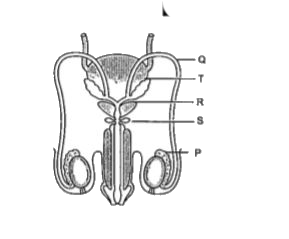
Which of the following is correct for labelled part P?
View SolutionRead the following and answer the following questions:
Human male reproductive system comprises of a pair of testes, primary sex organs associated with formation of gametes and production of sex hormone. Study the given figure of human male reproductive system and answer the following questions.
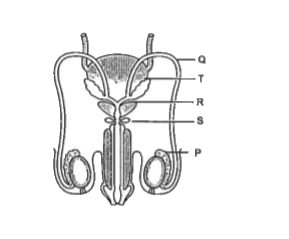
Identify the correctly matched pair:
View SolutionRead the following and answer the following questions:
Human male reproductive system comprises of a pair of testes, primary sex organs associated with formation of gametes and production of sex hormone. Study the given figure of human male reproductive system and answer the following questions.
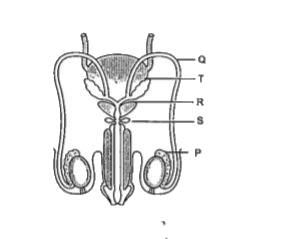
Which statements is incorrect for Q?
View SolutionRead the following and answer the following questions:
Human male reproductive system comprises of a pair of testes, primary sex organs associated with formation of gametes and production of sex hormone. Study the given figure of human male reproductive system and answer the following questions.
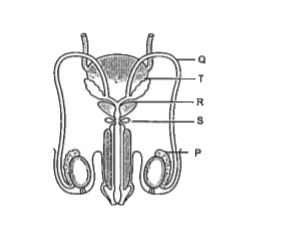
The function of the secretion of prostate gland is to:
View Solution
QUESTIONS (CHOOSING THE CORRECT OPTION) questions and complete solutions for chapter SAMPLE PAPER 2 (BIOLOGY) of SRIJAN BIOLOGY (ENGLISH) of Class 12